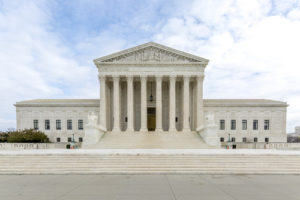Supreme Court Will Hear Travel Ban Case
 By the C|C Whistleblower Lawyer Team
By the C|C Whistleblower Lawyer Team
The Supreme Court announced this morning that it would hear the case on the lawfulness of President’s Trump’s March executive order limiting travel from six Muslim majority countries. The federal appeals courts have blocked President Trump’s order twice and the Supreme Court is now set to make the final determination on the lawfulness of the order. The Supreme Court also allowed some parts of the order to go into effect. Namely, any foreigners from the six named countries with no ties or relationship to the United States are prohibited from entering the country pending the decision on this case. Justices Thomas, Alito, and Gorsuch dissented from that part of the opinion saying that the Court should allow the entire order to go into effect pending the decision by the Court.
Justice Thomas commented “I fear that the court’s remedy will prove unworkable. Today’s compromise will burden executive officials with the task of deciding – on peril of contempt- whether individuals from the six affected nations who wish to enter the United States have a sufficient connection to a person or entity in this country.” The decision by the Court allows anyone from the six affected countries with a personal or institutional relationship to the United States to enter the country. This can include individuals with family in the United States or students attending American universities. The other members of the Court believe the distinction will be easy to administer.
The decision by the Court encompasses both the Fourth Circuit and Ninth Circuit decisions on the executive order. The Court will hear arguments on the case in October at the start of the new term. In addition to the text of the order, the argument and analysis at the Supreme Court will likely look to the statements of President Trump on Twitter that could demonstrate animus towards Muslims. The Court will analyze both the purpose and the motivation for the ban. Other appeals courts have found that the President’s statements reflected a negative animus towards the Muslim community and violated the First Amendment’s ban on government establishment of religion. It remains to be seen what direction the Court will take when it hears the case in October.